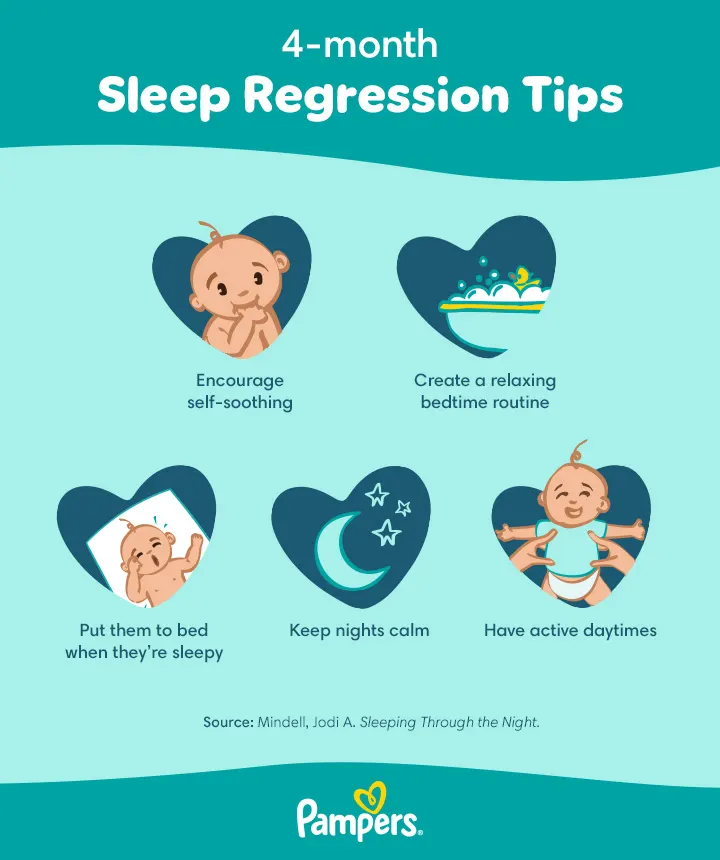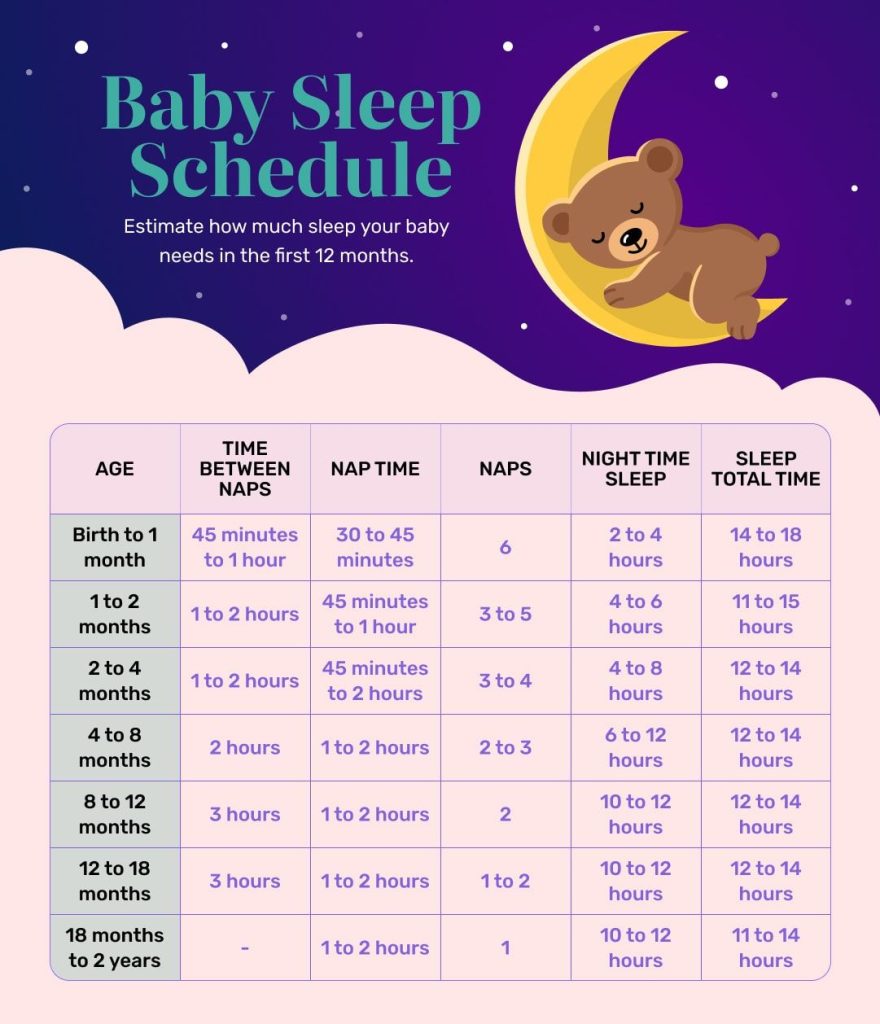Most babies eventually sleep through the night, but the timing varies for each child. Patience and consistency are key.
Parents often wonder when their baby will finally sleep through the night. This common concern affects many families, causing sleepless nights and daytime fatigue. While it’s normal for newborns to wake frequently, most babies start to sleep longer stretches by six months.
Establishing a bedtime routine helps signal to your baby that it’s time to sleep. Consistent sleep environments and soothing activities can make a big difference. Consulting with a pediatrician can provide personalized advice and reassurance. Remember, every baby is unique and will develop their sleep patterns at their own pace. Patience and consistency are crucial during this period.

Credit: www.pinterest.com
Introduction To Baby Sleep Patterns
New parents often wonder, “Will my baby ever sleep through the night?” Understanding baby sleep patterns is the first step in addressing this concern. Babies have unique sleep cycles that differ greatly from adults. Recognizing these patterns can help in creating a nurturing sleep environment.
Common Sleep Challenges
Parents face various sleep challenges with their babies. These challenges can include:
- Frequent night wakings
- Short naps
- Difficulty falling asleep
- Inconsistent sleep schedules
Understanding these challenges can make it easier to address them effectively.
Importance Of Sleep
Sleep is crucial for a baby’s development and well-being. Adequate sleep helps in:
- Brain development
- Physical growth
- Emotional regulation
- Strengthening the immune system
Ensuring your baby gets enough sleep is essential for their overall health.
Newborn Sleep Basics
Understanding newborn sleep patterns can be challenging for new parents. Babies have unique sleep needs that differ from adults. Knowing the basics helps in managing expectations and creating a suitable sleep environment.
Sleep Cycles In Newborns
Newborns experience shorter sleep cycles compared to adults. Each cycle lasts about 50-60 minutes. They spend more time in light sleep stages. This means they wake up frequently.
Babies alternate between active and quiet sleep. Active sleep involves rapid eye movements and irregular breathing. Quiet sleep is deeper, with regular breathing and minimal movements.
Expected Sleep Duration
Newborns sleep a lot, around 16-17 hours a day. Their sleep is spread out in short bursts. They usually sleep for 2-4 hours at a time.
Here’s a typical sleep pattern for newborns:
| Age | Total Sleep (Hours) | Daytime Sleep (Hours) | Nighttime Sleep (Hours) |
|---|---|---|---|
| 0-2 Months | 16-17 | 7-9 | 8-9 |
| 2-4 Months | 14-16 | 6-7 | 8-9 |
| 4-6 Months | 14-15 | 5-6 | 9-10 |
These durations are averages. Every baby is unique. Some may sleep more, others less.
Establishing A Bedtime Routine
Creating a bedtime routine can help your baby sleep better. A consistent routine helps signal that it is time to sleep. This can make bedtime easier for both you and your baby.
Consistent Bedtime
Setting a consistent bedtime is crucial. Try to put your baby to bed at the same time every night. This helps regulate their internal clock. You can start this routine as early as six weeks old.
| Age | Ideal Bedtime |
|---|---|
| 0-3 months | 8-9 PM |
| 4-6 months | 7-8 PM |
| 7-12 months | 7 PM |
Soothing Activities
Include soothing activities in the bedtime routine. These can help your baby relax. Here are some activities you can try:
- Bath time
- Reading a short story
- Singing a lullaby
- Gentle rocking
Keep these activities calm and quiet. Avoid stimulating activities like playing or watching TV. This will help signal that it is time to sleep.

Credit: www.thebump.com
Feeding And Sleep Connection
Understanding the feeding and sleep connection can help improve your baby’s sleep. Many parents wonder if feeding patterns influence sleep habits. Knowing the relationship between feeding and sleep can guide you toward better nights.
Night Feedings
Night feedings are common for babies. They often wake up hungry. This is especially true for newborns. Their tiny stomachs need frequent refills. Many babies wake multiple times for night feedings. These feedings provide essential nutrients. They also help maintain a baby’s growth.
Some parents prefer to breastfeed during the night. Others use formula. Both methods offer benefits. Breastfeeding can be soothing. It can also help a baby fall back asleep. Formula might keep babies full longer. Choose what works best for your family.
As babies grow, they may need fewer night feedings. The frequency of night feedings often decreases with age. This can lead to longer sleep stretches. Every baby is different. Monitor your baby’s hunger cues. Adapt as needed.
Transitioning From Night Feeds
Transitioning from night feeds is a key milestone. It can improve sleep for both baby and parents. Start by gradually reducing the amount of milk in each night feeding. This can help your baby adjust.
Offer a pacifier instead of a feeding. Sometimes, babies wake out of habit. A pacifier can provide comfort without food. Ensure your baby is getting enough calories during the day. This can reduce the need for night feedings.
Establish a consistent bedtime routine. A soothing routine signals it’s time to sleep. This can make the transition easier. Be patient. Every baby adjusts at their own pace.
| Age | Typical Night Feedings |
|---|---|
| 0-3 months | 2-3 times per night |
| 3-6 months | 1-2 times per night |
| 6-12 months | 0-1 times per night |
Remember, every baby is unique. Adjust strategies to fit your baby’s needs. Night feedings and the transition from them are part of the journey. Understanding the feeding and sleep connection is crucial. It can lead to better sleep for everyone.
Creating A Sleep-friendly Environment
Helping your baby sleep through the night can seem impossible. Creating a sleep-friendly environment can make a big difference. Here are some tips to get started.
Optimal Room Temperature
Babies sleep best in a cool, comfortable room. The ideal temperature is between 68-72°F (20-22°C). Use a thermometer to monitor the room’s temperature.
Dress your baby in light, breathable clothing. Avoid heavy blankets or bedding. Overheating can wake your baby and lead to health issues.
Consider using a fan to circulate air. This can help maintain a consistent temperature. Fans also provide white noise, which can help your baby sleep better.
Reducing Noise And Light
Babies are sensitive to noise and light. Reduce these to improve sleep quality.
- Noise: Use white noise machines or fans to mask sudden sounds. Keep the room quiet, especially during sleep hours.
- Light: Use blackout curtains to darken the room. Avoid nightlights or screens that emit blue light. Blue light can disrupt your baby’s sleep cycle.
Establish a bedtime routine to signal sleep time. A consistent routine helps your baby feel secure and ready for sleep.
| Factor | Tips |
|---|---|
| Temperature | Keep it between 68-72°F. Dress baby in light clothing. |
| Noise | Use white noise machines. Keep the room quiet. |
| Light | Use blackout curtains. Avoid blue light sources. |
Managing Sleep Regressions
Managing sleep regressions can be one of the most challenging aspects of parenting. Understanding and handling these disruptions can make a significant difference in your baby’s sleep patterns. This section will guide you through identifying and coping with sleep regressions.
Identifying Regressions
Sleep regressions are periods when a baby who was sleeping well suddenly starts waking up at night. These can occur at various stages, typically around 4 months, 8-10 months, and 18 months.
Key signs include:
- Increased night wakings
- Shorter naps
- Difficulty falling asleep
- More fussiness and clinginess
Coping Strategies
Here are some strategies to help you manage sleep regressions:
- Stick to a Routine: Consistency is crucial. Keep bedtime routines the same.
- Create a Calming Environment: Use white noise, dim lights, and a comfortable room temperature.
- Offer Comfort: Extra cuddles and reassurance can help soothe your baby.
- Monitor Sleep Cues: Watch for signs of sleepiness and act quickly.
- Ensure Proper Nutrition: Hunger can disrupt sleep. Ensure your baby is well-fed during the day.
By identifying and addressing sleep regressions, you can help your baby return to a more restful sleep pattern. Remember, patience and consistency are key.
Safe Sleep Practices
Worried if your baby will ever sleep through the night? One crucial factor in ensuring your baby’s restful sleep is practicing safe sleep practices. These practices are vital for your baby’s health and can help prevent sudden infant death syndrome (SIDS). Let’s dive into some essential guidelines and tips for safe sleep.
Safe Sleep Guidelines
- Always place your baby on their back to sleep.
- Use a firm sleep surface, like a mattress in a safety-approved crib.
- Keep soft objects, toys, and loose bedding out of the baby’s sleep area.
- Share your room with your baby, but not your bed.
- Avoid overheating; dress your baby in light sleep clothing.
Preventing Sids
Preventing SIDS is a top priority for new parents. Here are some steps you can take:
- Ensure your baby has a smoke-free environment.
- Offer a pacifier at nap time and bedtime.
- Breastfeed your baby if possible; it can reduce the risk of SIDS.
- Avoid using commercial devices marketed to reduce the risk of SIDS.
- Make sure your baby has regular tummy time when awake.
Remember, creating a safe sleep environment is crucial for your baby’s well-being and your peace of mind.
When To Seek Professional Help
As a parent, sleepless nights can be overwhelming. It’s normal to worry about your baby’s sleep patterns. But sometimes, it’s important to seek professional help. Knowing when to consult a pediatrician can make a big difference.
Signs Of Sleep Disorders
Recognizing the signs of sleep disorders is crucial. Here are some key indicators:
- Frequent night waking
- Difficulty falling asleep
- Excessive daytime sleepiness
- Snoring or breathing irregularities
- Unusual movements during sleep
If your baby shows any of these signs, it may be time to consult a professional.
Consulting A Pediatrician
Your pediatrician can provide valuable insights. They can help identify any underlying issues. Here’s what to expect during a consultation:
- Detailed sleep history
- Physical examination
- Possible referrals to sleep specialists
- Recommendations for sleep studies
It’s important to share all relevant information with your doctor. This helps them make an accurate diagnosis. Early intervention can improve your baby’s sleep and overall health.
Conclusion And Encouragement
It’s natural to wonder, “Will my baby ever sleep through the night?” Many parents face this challenge. With the right approach, you can help your baby develop healthy sleep habits.
Patience And Persistence
Patience is key. Babies take time to adjust to sleep routines. Consistency helps in teaching your baby when to sleep. Develop a calming bedtime routine. This could include a warm bath, a gentle lullaby, or quiet reading time.
Persistence is equally important. Stick to the routine every night. Even if progress seems slow, don’t give up. Your efforts will pay off in the long run. Celebrate small victories. Each step forward is progress.
Support Resources
Many resources are available to support you. Books on baby sleep can offer valuable insights. Online forums and parenting groups provide a sense of community. Sharing experiences with other parents can be encouraging.
Consider consulting a pediatrician. Professional advice can be reassuring. They can offer tailored suggestions for your baby’s needs. Sleep consultants can also be helpful. They specialize in creating sleep plans for babies.
Here is a table of recommended resources:
| Resource Type | Examples |
|---|---|
| Books | Healthy Sleep Habits, Happy Child |
| Online Forums | BabyCenter, What to Expect |
| Professional Help | Pediatricians, Sleep Consultants |
Remember, every baby is unique. What works for one may not work for another. Keep trying different methods until you find the right one for your baby.

Credit: www.childsfarm.com
Frequently Asked Questions
Do Some Babies Never Sleep Through The Night?
Yes, some babies never sleep through the night. Sleep patterns vary widely among infants. Consistent routines may help improve sleep.
At What Age Do Babies Consistently Sleep Through The Night?
Babies typically start consistently sleeping through the night around 6 months of age. Each baby is unique, so variations occur. Establishing a bedtime routine can help.
How Do I Get My Baby To Sleep Through The Night?
Establish a consistent bedtime routine. Keep the room dark and quiet. Offer a soothing activity before sleep. Ensure the baby is comfortable. Avoid nighttime feeds or interactions.
What Age Should A Baby Go Through The Night?
Most babies start sleeping through the night around 6 months old. Each baby’s sleep pattern can differ.
How Can I Help My Baby Sleep Through The Night?
Establish a consistent bedtime routine. Ensure the sleep environment is calm and comfortable.
Conclusion
Every baby’s sleep pattern is unique. Patience and consistency can help establish better sleep habits. Trust your instincts and seek support when needed. Remember, this phase is temporary. Soon enough, your baby will sleep through the night, allowing everyone to rest better.
Keep nurturing and comforting them through this journey.


